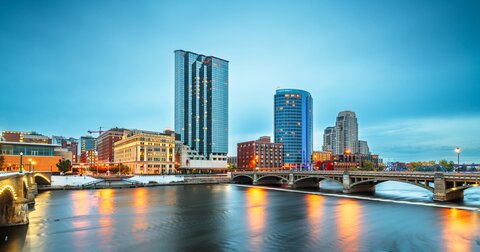Grand Rapids seeks feedback on climate action plan
Proposal calls for eliminating greenhouse-gas emissions by 2040
“The climate change crisis is one of the City’s top priorities,” the city of Grand Rapids says, and it is developing a plan to act on that belief.
The draft of the climate action and adaptation plan aims to reduce greenhouse gas emissions and encourage electrification. It has six chapters: Energy (more solar use), Healthy Homes (less electric use; income-based electric rates), Commercial buildings (less energy use), Transportation (more carpooling and cycling, denser developments), Natural Systems (more trees and rain gardens), and Food systems (more urban agriculture and composting, less food in trash).
Public comment is open through Oct. 31, 2024. The city expects to release a full draft plan in December.
The plan has as its benchmark the amount of greenhouse gases emitted by municipal operations in 2008, with the goal of an 85% reduction by 2030 and a 100% reduction by 2040.
The plan will try to reduce community greenhouse gas emissions by 62.8% per capita by 2030, with 2019 as the benchmark. It calls for a 100% per capita reduction by 2050, according to Interim Chief Sustainability Officer Annabelle Wilkinson.
“We plan to achieve these through the goals, strategies and actions outlined in the upcoming Climate Action and Adaptation Plan. The website you linked to includes the current draft chapters available for public review and the timeline we’re working on for finalization,” Wilkinson told Michigan Capitol Confidential in an email.
The plan aims to reduce building energy consumption through requiring building owners to report their energy use, creating building performance standards, and using tune-ups, audits, or retro-commissioning. Draft plans call for establishing a workgroup to create a plan to significantly reduce energy consumption and costs for small and minority-owned businesses.
“Our Commercial Building Chapter does include consideration of a benchmarking policy,” Wilkinson wrote. “That recommendation came from over a year of engagement with community stakeholders on a Commercial Buildings Climate Advisory Team - however the current draft available online does not take into account the feedback we have received from public engagement taken over the summer (Commercial Building Climate Plan Chapter Event hosted by West Michigan Sustainable Business Forum, U.S. Green Building Council, and the Grand Rapids Chamber of Commerce) and the survey responses we are currently collecting on the draft chapters.”
The plan would mandate commercial buildings over 10,000 square feet to report their energy usage.
Other plans call for streamlining the process for installing solar and electric vehicle charging infrastructure within existing buildings. They also call for promoting strategies such as “when it dies - electrify.” The city might enact a policy requiring high-performing / zero-emissions new construction and major renovation and encourage other businesses to adopt a similar policy.
Grand Rapids is basing its climate plan on those of other large cities, including Austin, Texas; Minneapolis, Minnesota; Portland, Oregon; and Providence, Rhode Island.
The business community has submitted feedback and will stay engaged as the plan develops, according to Joshua Lunger, the vice president of government affairs at the Grand Rapids Chamber of Commerce. Those who own property, commercial real estate, and small businesses would be most impacted by this proposal.
“We’re waiting to see how it’s presented to the city because it’s still in draft form,” Lunger told Michigan Capitol Confidential in a phone interview.
The City of Grand Rapids Office of Sustainability and the GR2030 District will oversee the program. If the city adopts the plan, the City Commission must suggest and approve policy changes.
Michigan Capitol Confidential is the news source produced by the Mackinac Center for Public Policy. Michigan Capitol Confidential reports with a free-market news perspective.


 Feedback mostly opposes Grand Rapids climate plan
Feedback mostly opposes Grand Rapids climate plan
 Drive less, use less energy, switch to electric vehicles, says Grand Rapids climate action plan
Drive less, use less energy, switch to electric vehicles, says Grand Rapids climate action plan
 EGLE flap leaves 150,000 tons of waste headed for Michigan landfills
EGLE flap leaves 150,000 tons of waste headed for Michigan landfills